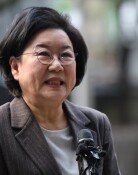"We Have Our Own Strategies in Chinese Marketing"
"We Have Our Own Strategies in Chinese Marketing"
Posted November. 01, 2004 22:58,
Common Factor of the Four Major Conglomerates-
The four major conglomerates all have their major companies in Beijing and are managing the production plants and marketing corporations spread throughout the continent. Recently, they have increased the number of production plants in China, and with the exception of high tech products, all local demand will be locally produced.
The supply cycles of new products are speeding up as the importance of the Chinese market rises. Hyundai used to export three- to four-year old models of Sonata or Elantra to China, but is now planning to showcase the Sports Utility Vehicle (SUV) Tuscon, which came out in Korea early this year, in China this December. Samsung Electronics and LG Electronics are also showcasing new high-priced products in Korea and China at the same time.
Premium Market or Mass Market-
LG Electronics and Hyundai-Kia Motors all-in strategies are big enough that the companies fates could be determined by their performance in the Chinese market.
LG Electronics, which has the largest market share in China in terms of plasma display panel (PDP) and liquid crystal display (LCD), is also competing for the number one spot with Chinese companies in the household appliances market that includes washing machines, refrigerators, air conditioners, and microwave ovens. LG Electronics revealed, LG Electronics mostly produces household appliances, but in China, high-priced products cannot make much profit. We are making strategies to sweep both the premium and the mass market by maintaining large-scale local production plants.
Hyundai-Kia Motors has set a goal of increasing automobile production in China to one million units and capturing 20 percent (currently 10 percent) of the Chinese market by 2007, and is setting up its full lineup in China at a tremendous speed.
Gu Yeong-gi, China Team manager at Hyundai Motor Company, said, Under the situation in which all global automobile companies are putting everything into the Chinese market, there is no time to hesitate in investment, adding, It is impossible to reach the goal of becoming global top five by 2010 without having success in China.
On the contrary, Samsung Electronics is still focusing on the higher-income class and using a premium strategy. Kim Young-jin, a director in Samsungs main office in China, said, China does not have a big part in Samsung Electronics sales as of now, and the companys tendency to place emphasis on risk management is also acting as a factor.
Chey Tae-won, chairman of SK Corporation, established a Chinese holding company in Beijing last month and announced he will change the introverted corporate culture into one that cultivates foreign markets.
Byong-Ki Lee Jung-Eun Lee eye@donga.com lightee@donga.com







